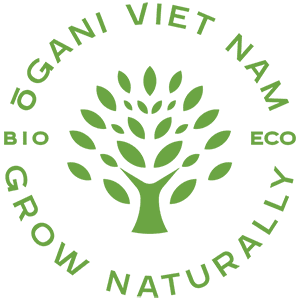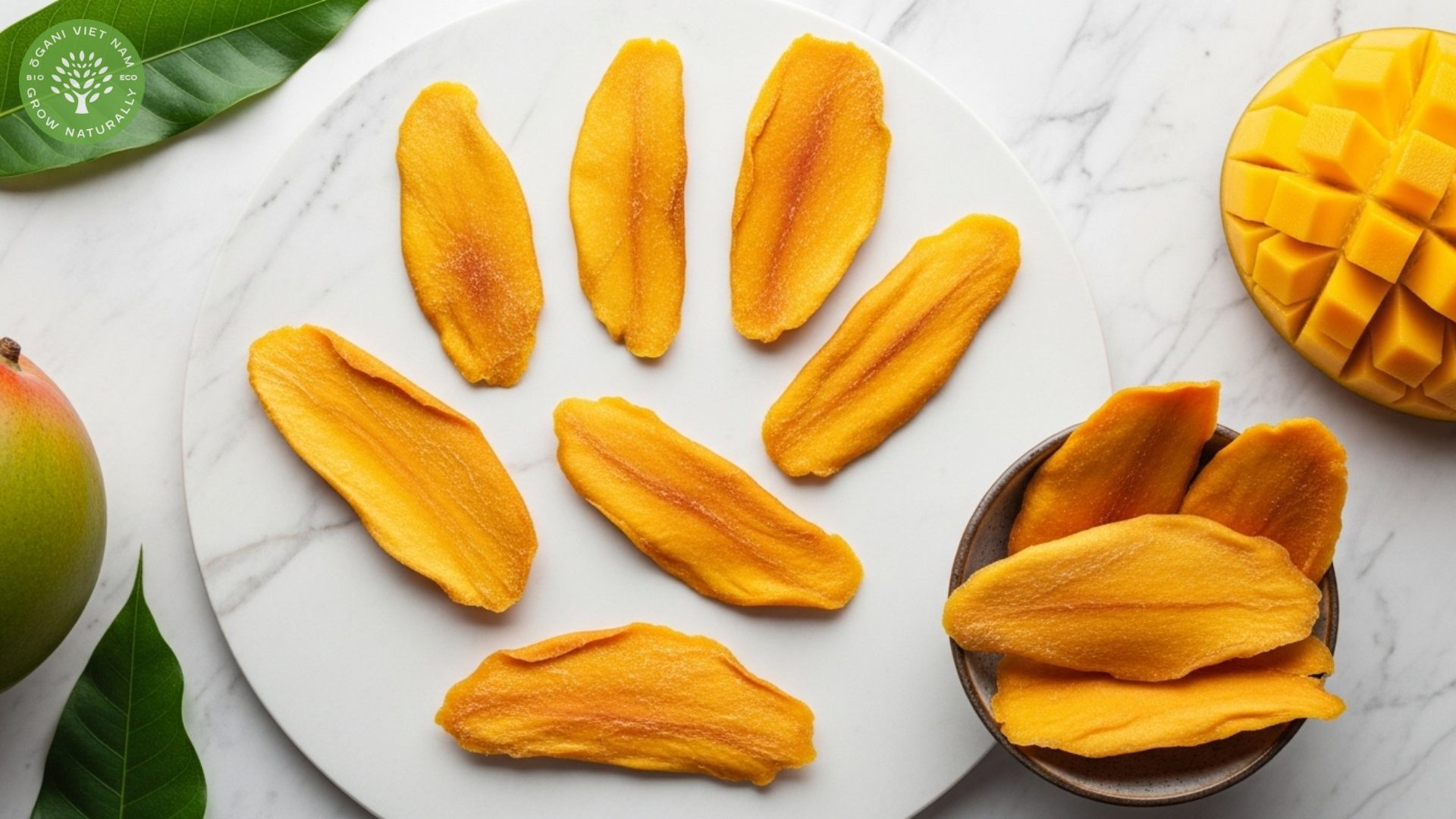Nutritional value dried mango offers a concentrated source of vitamins, minerals, and natural energy, making it a popular choice for health-conscious snacking. At Ogani VN, we understand that knowing exactly what goes into your body matters—dried mango delivers essential nutrients like vitamin A, vitamin C, fiber, and antioxidants, though it comes with higher sugar and calorie density compared to fresh fruit.
Understanding the nutritional value dried mango provides
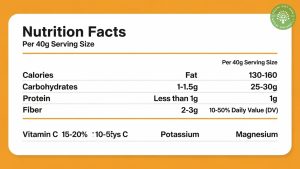
When fresh mango undergoes the dehydration process, water content drops from about 83% to roughly 15-20%, creating a concentrated nutritional profile. This transformation means you’re getting more nutrients per gram, but also more natural sugars and calories in a smaller portion.
A standard 40-gram serving (about a small handful) typically contains 130-160 calories, with the majority coming from carbohydrates. The nutritional value dried mango provides includes approximately 1-1.5 grams of protein, minimal fat (less than 1 gram), and around 25-30 grams of carbohydrates. What stands out is the fiber content—you’ll get about 2-3 grams per serving, which supports digestive health and helps you feel satisfied longer.
The vitamin profile is particularly impressive. Dried mango retains much of its vitamin A content, offering around 15-20% of your daily needs in one serving. This fat-soluble vitamin plays a crucial role in maintaining healthy vision, supporting immune function, and keeping your skin vibrant. Vitamin C survives the drying process reasonably well, providing about 10-15% of daily requirements, though some degradation occurs during heat exposure.
Mineral content includes potassium (supporting heart health and blood pressure regulation), magnesium (essential for muscle and nerve function), and small amounts of iron and calcium. The golden-orange color signals the presence of beta-carotene and other carotenoids—powerful antioxidants that protect cells from oxidative stress.
Key components of nutritional value dried mango offers
Vitamin A and beta-carotene content
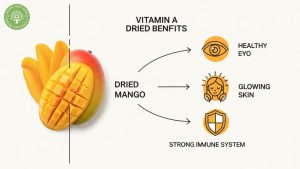
The brilliant orange hue of dried mango comes from beta-carotene, which your body converts into vitamin A. This nutrient is non-negotiable for eye health—it helps prevent night blindness and supports the health of your cornea. We’ve noticed customers who snack on dried mango regularly often mention better skin texture, which makes sense given vitamin A’s role in cell turnover and collagen production.
One serving provides roughly 750-1000 IU of vitamin A, contributing significantly to the recommended 3000 IU daily intake for adults. Unlike synthetic supplements, the beta-carotene from dried mango converts to vitamin A only as your body needs it, reducing the risk of toxicity.
Vitamin C and immune support
While drying does reduce vitamin C levels compared to fresh mango (which contains about 60mg per cup), dried mango still contributes 8-12mg per serving. This water-soluble antioxidant vitamin supports your immune system, aids in iron absorption from plant sources, and participates in collagen synthesis.
At Ogani VN, we recommend pairing dried mango with iron-rich foods like nuts or seeds in trail mix—the vitamin C enhances iron bioavailability, making it a smart combination for those following plant-based diets.
Essential minerals for body function
Potassium content in dried mango (around 200-250mg per serving) helps counterbalance sodium intake, supporting healthy blood pressure levels. This electrolyte is particularly valuable after physical activity when your body needs replenishment.
Magnesium, though present in smaller amounts (15-20mg per serving), contributes to over 300 enzymatic reactions in your body. It supports energy production, muscle relaxation, and bone health. The small amounts of copper and manganese present also play supporting roles in antioxidant defense systems.
Nutritional value dried mango vs fresh mango comparison
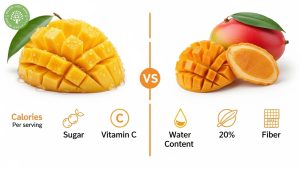
The debate between dried and fresh often comes down to context and purpose. Fresh mango delivers more volume with fewer calories—one cup of fresh mango pieces contains about 99 calories compared to 314 calories per 100 grams of dried. The water content in fresh fruit creates natural portion control and better hydration.
However, nutritional value dried mango excels in portability and shelf stability. When you’re traveling, hiking, or need a quick energy boost without refrigeration, dried mango becomes the practical choice. The concentrated nutrients mean you’re getting more vitamins and minerals per bite, though you’ll also consume more sugar.
Fresh mango provides superior vitamin C content—about 67mg per cup versus 8-12mg in a serving of dried. The enzyme content is also higher in fresh fruit, with bromelain and other digestive enzymes remaining active. Fresh mango’s high water content (about 150ml per cup) contributes to daily hydration needs, something dried fruit cannot match.
The fiber structure differs between the two forms. Fresh mango offers softer, more gel-like soluble fiber, while dried mango provides chewier, more concentrated fiber that some people find more satisfying. Both types support gut health, but the dried version gives you more fiber density per serving.
Sugar concentration is where the biggest difference emerges. That same 40-gram serving of dried mango contains about 20-24 grams of natural sugar, while an equivalent weight of fresh mango would have only 12-14 grams. This doesn’t mean added sugar—it’s the natural fructose concentrated through water removal—but it does impact blood sugar response.
Maximizing nutritional value dried mango in your diet

Dried mango brings legitimate health advantages when consumed mindfully. The antioxidant profile includes mangiferin, a bioactive compound studied for its anti-inflammatory properties. Polyphenols present in dried mango may help reduce oxidative stress and support cardiovascular health. The fiber content aids digestive regularity and feeds beneficial gut bacteria.
For athletes and active individuals, dried mango serves as a natural energy source. The simple sugars provide quick fuel, while the small amount of protein and fiber helps sustain energy release. We’ve heard from customers who pack dried mango on long cycling trips or hiking adventures—it’s lightweight, doesn’t spoil, and delivers fast energy when needed.
The vitamin A content supports immune function year-round, particularly important during seasons when fresh produce variety decreases. Some research suggests the carotenoids in mango may have protective effects against certain cancers, though more human studies are needed.
However, the nutritional value dried mango comes with considerations. The calorie density means it’s easy to overconsume—what feels like a small snack can deliver 250-300 calories if you’re not measuring portions. For people managing blood sugar, the concentrated fructose can cause spikes, especially when eaten alone without protein or fat to slow absorption.
Some commercial dried mango contains added sugar or sulfites used as preservatives. At Ogani VN, we emphasize reading labels carefully. Look for products listing only “mango” in the ingredients, with no added sweeteners. Sulfur dioxide (often listed as E220) can trigger reactions in sensitive individuals, particularly those with asthma.
The chewy texture, while appealing, can pose dental concerns. The natural sugars and sticky consistency may cling to teeth, potentially contributing to cavity formation if proper oral hygiene isn’t maintained. We suggest rinsing your mouth with water after enjoying dried mango.
Portion control is your friend when trying to maximize the nutritional value dried mango offers without overdoing calories. Pre-portion servings into small containers or bags—around 30-40 grams per serving—to avoid mindlessly eating from a large bag. This amount gives you the nutritional benefits without excess calories.
Create balanced snack combinations rather than eating dried mango alone. Pair it with raw almonds, cashews, or walnuts for protein and healthy fats that slow sugar absorption. The combination of sweet fruit with savory nuts creates satisfying contrast while improving the overall nutrient profile.
Use chopped dried mango as a natural sweetener in homemade granola or energy bars. It adds sweetness, chewiness, and nutrients without refined sugar. We’ve experimented with mixing it into oatmeal during cooking—the fruit softens and distributes throughout, eliminating the need for additional sweeteners.
Add dried mango to salads for tropical flair. It pairs beautifully with mixed greens, grilled chicken, avocado, and a citrus vinaigrette. The sweet-tart flavor complements savory dishes without overwhelming them. Some of our customers dice it finely and include it in grain bowls with quinoa, roasted vegetables, and tahini dressing.
Rehydrate dried mango by soaking it in warm water for 15-20 minutes, then blend it into smoothies or use it in baking. This technique works especially well when making mango salsa, chutneys, or curry sauces where you want mango flavor without the fibrous dried texture. Understanding the nutritional value dried mango maintains even after rehydration helps you make informed choices about preparation methods.
For parents, dried mango can be a healthier alternative to candy in school lunches, though it’s still a treat rather than an unlimited snack. Teaching children appropriate portions—maybe 3-4 pieces—helps them learn balanced eating habits while enjoying natural sweetness.
Frequently Asked Questions
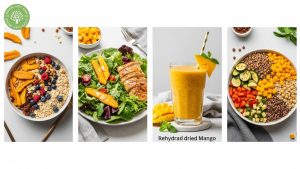
Is dried mango healthier than fresh mango?
Neither is universally “healthier”—they serve different purposes. Fresh mango provides more volume, water content, and vitamin C with fewer calories per serving. Dried mango offers concentrated nutrients, better portability, and longer shelf life. Choose based on your situation: fresh for hydration and lower calorie density, dried for convenience and nutrient concentration.
How much dried mango should I eat daily?
A reasonable serving is 30-40 grams (about 6-8 pieces), which provides nutritional benefits without excessive sugar or calories. This amount fits well into a balanced diet when consumed as an occasional snack rather than a daily staple. Those managing blood sugar should consult healthcare providers about appropriate portions.
Does dried mango have added sugar?
Quality dried mango contains only natural fruit sugars with no additives. However, some commercial brands add sweeteners or coat pieces in sugar syrup. Always check the ingredient list—it should list only “mango” or “dried mango.” The nutritional value dried mango delivers is best when choosing unsweetened varieties.
Can dried mango help with constipation?
Yes, the fiber content (2-3 grams per serving) can support digestive regularity when combined with adequate water intake. The chewy texture and natural sugars also stimulate digestive movement. However, eating too much dried fruit without sufficient hydration can have the opposite effect, so balance is important.
Is dried mango good for weight loss?
Dried mango can fit into a weight loss plan when portion-controlled, but it’s calorie-dense and won’t fill you up as much as fresh fruit. The 130-160 calories per small serving add up quickly. If weight loss is your goal, prioritize fresh fruit for volume and saved dried mango for occasional treats or pre-workout energy.
Making smart choices with dried mango nutrition
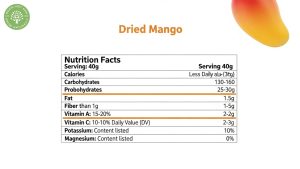
Understanding the nutritional value dried mango provides empowers you to make informed snacking choices. This tropical fruit delivers concentrated vitamins A and C, essential minerals, beneficial fiber, and natural energy—all in a portable, shelf-stable form. While the sugar and calorie density require mindful portion control, dried mango earns its place in a balanced diet when consumed appropriately.
At Ogani VN, we believe food should nourish both body and taste buds. Whether you’re looking for a natural energy boost before workouts, a satisfying afternoon snack, or a nutritious addition to your trail mix, quality dried mango delivers. Browse our selection of premium dried fruits, carefully sourced for maximum flavor and nutritional integrity. Visit our website today to explore products that support your healthy lifestyle—because good nutrition shouldn’t mean sacrificing enjoyment.
Read more:
- Dried Mangoes Benefits: Healthy Snacking With Ogani VN.
- Dried Pineapple No Sugar Added: Healthy Snack by Ogani VN
- Dragon Fruit Powder: Unlocking Ít Superfood Potential for Health and Wellness.
- Dried Mango Nutrition Facts: Complete Guide To Calories, Benefits & Health Impact
- Nutritional Value Dried Mango: Complete Guide to Benefits and Facts
